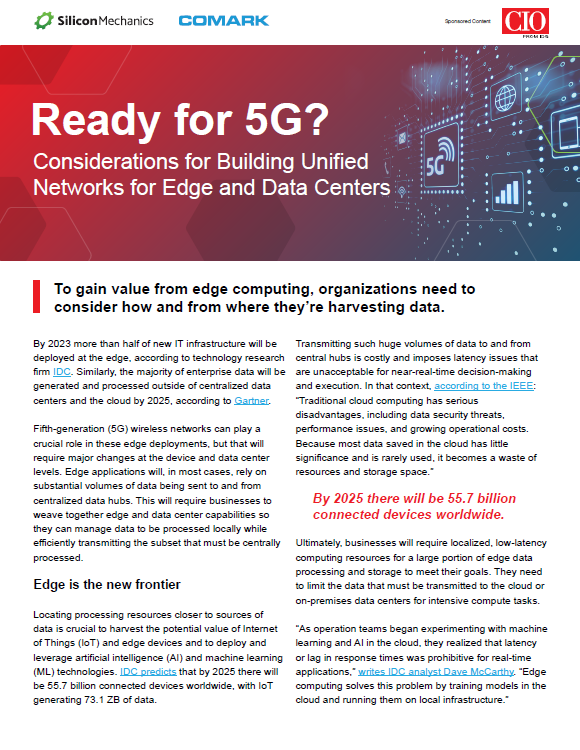5G Solutions
Prepare Your Datacenter for 5G
The datacenter is the hub of the modern computing model. With 5G, the amount of information that the datacenter will be
asked to manage will grow dramatically, likely in ways we can’t fully anticipate today.
Organizations seeking competitive advantage will be want to take full advantage of their new ability to quickly ingress and egress much more data. The result will be everything from more HPC clusters, new or expanded AI systems, and more HPC or AI resources to the cloud in full or hybrid HPC/AI in the cloud. However, datacenters that support these deployments will need specific changes to operate to their potential.

Learn More
Discover what considerations go into building a 5G datacenter in this paper from CIO magazine.
Download the White PaperWith the uncertainty surrounding future datacenter design and the reluctance of some organizations to move to the cloud because of latency and security, performance, cost, or availability issues, HPC and AI clusters designed with composable infrastructure have never been so important.
Composable infrastructure refers to the practice of abstracting resources from their physical locations, converging them into a single resource pool, and managing them with software via a cloud-based interface. On-premises servers can be retasked to go from compute to storage nodes or vice versa. Network changes can be made on the fly. Costs go down and productivity goes up, all without moving your computing to the cloud.
Engineering hardware systems that can take advantage of composable infrastructure is one of Silicon Mechanics’ areas of expertise. Contact us to learn more about how your datacenter, HPC cluster, or AI system can benefit from composable infrastructure.
Enabling HPC & AI on the Edge with 5G
Fifth generation networks will accelerate the AI revolution by allowing AI (and HPC) on the edge of the computing network. Real-time analysis and the resulting sense-and-react actions (as used in driverless vehicles, for example) will be possible any place a sensor can be deployed.
There is a great business case for AI and HPC on the edge.
- Edge-based AI reduces privacy concerns associated with transmitting or storing data in the cloud.
- Computing on the edge also reduces the bandwidth and latency issues that degrade data transmission capacity when using the cloud.
- Faster, automated intelligence means a better end user experience, which could be a competitive advantage for some organizations.
But the IoT devices of tomorrow won’t look like they do today. They can’t. Today’s devices aren’t built to handle the challenges HPC and especially AI place on hardware. But there is a solution.
Edge devices are just end nodes – though, today, many do not process as much information as datacenter-based computers. With GPU and FPGA-acceleration built in, however, that can change. Today there are exciting new design options for compute, storage, and networking on the edge that make even real-time AI on the edge a viable option for many organizations.

Learn More
Read about some of the engineering considerations of 5G-enabled HPC and AI on the edge in this paper from CIO magazine.
Download the White PaperMake AI on the edge even more effective with hybrid composable infrastructure specially designed for the edge. Now, edge resources can be abstracted from their physical locations and managed by software via a cloud-based interface. You can get the same value at the edge as when you reconfigure your datacenter compute, storage, and networking resources.
Speak with an engineer to learn more about HPC and AI on the edge.
Expert Included
Our engineers are not only experts in traditional HPC and AI technologies, we also routinely build complex rack-scale solutions with today's newest innovations so that we can design and build the best solution for your unique needs.
Talk to an engineer and see how we can help solve your computing challenges today.